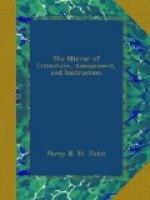During the schisms occasioned in this country by the French revolution, Mr. Grey enrolled himself in a political society, called the Friends of the People. He also became a member of the Whig Club, then in the zenith of its celebrity. His active advocacy of the cause of a reform in parliament was equal within and without the house of commons. To quote one of his Lordship’s most recent speeches, “In 1786 he had voted for reform. He had supported Mr. Pitt in his motion for shortening the duration of parliaments. He had given his best assistance to the measure of reform introduced by Mr. Flood, before the French revolution; and, on one or two different occasions, he had originated motions on the subject."[3] One of these was in 1793, when he presented a petition for reform and a shorter duration of parliament, from the Society of the Friends of the People: his motion for a committee was lost by 280 to 41. Another occasion to which his Lordship alludes, was in 1797, when he proposed, in his plan of parliamentary reform, to give to the county of York four new members; to divide each county into two districts, each returning a member. Copyholders and leaseholders were to have equal rights of voting with freeholders, as were all householders paying taxes in cities and boroughs; and parliaments were to be triennial. This motion was, however, negatived by 149 votes.
[3] Speech on the second reading
of the Reform Bill, in the House
of
Lords, Oct. 4, 1831.
In 1795, Mr. Grey opposed with great firmness, Mr. Pitt’s motion for the adjustment of the Prince of Wales’s debts, and moved for the reduction of the Prince’s income. He professed himself ready to support the real splendour of the royal family “as any slippery sycophant of a court;” but said he thought there was more true dignity in manifesting a heart alive to the distresses of millions, than in all those trappings which encumber royalty without adorning it. He asked whether the legislature should give an example of encouraging extravagance at a moment when the prevailing fashion of prodigality among people of fortune was rapidly destroying their independence, and making them the tools of the court, and the contempt of the people. He knew the refusal to pay his debts would be a severe privation to the Prince of Wales; but it would be a just penalty for the past, a useful lesson for the future, and a proper deference to the severe pressure and privations endured by the people. Mr. Grey’s amendment was supported by what was then a strong majority—99 to 260; and the original motion carried: his conduct on this occasion seems never to have been forgotten by the Prince of Wales, the Regent or the King. It should here be mentioned, that, with equal justice, Mr. Grey subsequently defended the rights of His Royal Highness from the shackles proposed to be laid on him as Regent.




